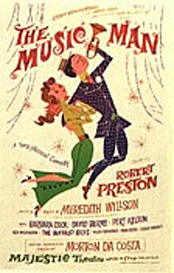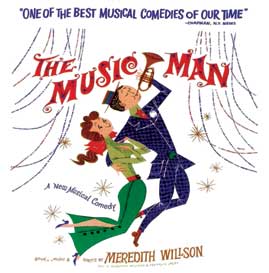
The Music Man
Book, Music and Lyrics by Meredith Willson
Story by Meredith Willson and Franklin Lacey
Majestic Theatre, Broadway - December 19, 1957 (1375 perfs)
Adelphi Theatre, London - 16 March, 1961
Synopsis
THERE is nothing more disarming than the gentle form of flattery that suggests our children have some unsuspected artistic talent. It is this flattery which Harold Hill (a virile baritone) employs; so cleverly that his confidence trick of posing as a Professor of Music claiming to teach boys how to play military band instruments over-night, succeeds in town after town to which he plays " flying visits "-until he tries it in River City, Iowa. There, after initially impressing upon all but a few die-hards, the need to give young people the sort of interests-like forming a Town Band, for instance!-that will keep them " off the streets his all too expedient theories begin to be suspect, especially by Marian Paroo (soprano), the local librarian and music teacher. Because Harold falls in love with her he fails to make his usual escape by train in time to avoid confrontation with the town officials who have been " tipped off " about him by a rival salesman. A demonstration is demanded of the efficacy of Harold Hill's teaching methods from the Band he has formed, and although their rendering of Beethoven's " Minuet in G " leaves much to be desired, the performance arouses such enthusiasm among the wishful thinking parents that he is completely exonerated.
The best known song is undoubtedly the stirring SEVENTY-SIX TROMBONES, sung by Harold as he paints the vision of a boys' Town Band resplendent with the instruments and uniforms he has persuaded their mothers and fathers to buy. Other songs are GOOD-NIGHT MY SOMEONE and TILL THERE WAS YOU. A male quartet of School Governors, oddly-sized, can be used to comic effect, as whenever they press the " Professor " for his credentials, he sets them off warbling memorable old-fashioned songs, and thereby avoids a " show-down." The plentiful chorus work frequently demands rapid and precise articulation as in PICK-A-LITTLE, TALK-A-LITTLE for the ladies of River City, and the wonderfully effective opening number, ROCK ISLAND, for the salesmen, delivered in rail-road speech-rhythm as they journey to their destinations.
This is an interesting Musical to stage-manage. The costuming, of the 1912 period, is reasonably simple; choreography, though somewhat stylised, is not demanding.
Summary of Plot
Professor Harold Hill has developed a reputation among travelling salesmen and none of it good. In order to sell his band instruments and uniforms he promises to form a local student band. After he gets paid it's away - and - no band. He is concentrating this time on River City, Iowa. To focus attention on the need for a boys' band he attacks the town's new pool hall as a sign of depravity creeping into the community. His argument is convincing, but it turns out the pool hall is owned by Mayor Shinn who orders the school board to check out Harold's credentials.
When they approach him he turns them into a barber-shop quartet and disappears. An old friend has warned him about Marian, the town librarian and music teacher. To Harold this is an old problem, but his advances are met with a brick wall. Later at the Fourth of July celebration Harold takes advantage of a disrupting prank to move in and sell his band idea. The Mayor continues to push for proper credentials, but Harold is slippery. Marian's research pays off, but she withholds the evidence when she discovers Harold is helping her brother, Winthrop, to cure his speech impediment,. With the exception of the Mayor, the town is now under Harold's spell. Even Marian is coming around. The band instruments have arrived, but it takes a little longer for the uniforms and instruction books.
Future band members have been busily working on Harold's "Think System" of musicianship, and Harold has just met Marian at the footbridge. She confesses that she has known he was a fake since the third day he was in town. Now it's Harold who is off balance. The uniforms arrive but so does Charlie Cowell, the anvil salesman, Harold's arch enemy. Marian tries to prevent Charlie from getting to the Mayor, but is unsuccessful. She wants to warn Harold, but Charlie reaches him first. He still has time to run, but can't. He's hooked on Marian.
The angry town, hearing that he's a fake, drags Harold to the ice cream social where everyone has gathered. The talk is ugly, but Marian speaks out in his defence. She's a good salesman herself, but there's a pay-off. The band arrives in assorted, unaltered, uniforms. Harold is handed a baton. "Think, men, think" is his command. At the drop of his arm comes the "Minuet in G" as it has never been "played" before. But each struggling note is music to each parent's ears. Harold has his band at last - and a truly loving librarian besides.
Musical Numbers
- Rock Island

- Iowa Stubborn
- Trouble
- Piano Lesson
- Goodnight My Someone
- Seventy Six Trombones
- Sincere
- The Sadder-But-Wiser Girl
- Pick-a-little
- Goodnight Ladies
- Marian the Librarian
- My White Knight
- Wells Fargo Wagon
- It'sYou
- Shipoopi
- Lida Rose
- Will I Ever Tell You
- Gary, Indiana
- Till There Was You
Instrumentation:
Flute/Piccolo/Bb Clarinet (flute and piccolo also in clarinet notation), 1st B5 Clarinet/Tenor Saxophone, 2nd Bb Clarinet/Bass, 3rd Bb Clarinet/ Baritone Saxophone; 3 Bb Trumpets, Trombone; Percussion; Violin, Bass.
Libretto and Vocal Score on Sale
Cast:
29 roles, 14 principals, including 2 children, and an authentic barber-shop quartet. 6 to 10 children.
Harold Hill, disarming, articulate actor, sings and dances.
Marian, accomplished actress, legit voice, minor dancing.
Marcellus, comic who sings and dances.
Mayor Shinn, straight character role.
Zenetta and Tommy, young lovers, dancers who sing.
Mrs. Shinn and 5 women, busybodies who sing.
Mrs. Paroo, character woman who sings.
Winthrop, small boy with speech impediment, sings and acts.
Amaryllis, 10-year-old girl, sings, helps if she plays the piano.
A horse.
Large singing and dancing ensembles. Total cast, 40-60.
Scenes and Settings
2 acts, 16 scenes, 7 full stage sets (including 4 drops), 1 fly-in (hotel), 2 scene drops, 1 painted traveller. Locomotive orchestra drop optional.
ACT I
Scene 1 : Railway Coach.
Scene 2: Town Square, River City, Ia.
Scene 3: The Paroos' House.
Scene 4: Madison Gymnasium.
Scene 5: Exterior of Madison Library.
Scene 6: Interior of Madison Library.
Scene 7: A Street.
Scene 8: The Paroos' Porch.
Scene 9: Town Square.
ACT II
Scene 1 : Madison Gymnasium.
Scene 2: Hotel Porch.
Scene 3: The Paroos' Porch.
Scene 4: The Footbridge.
Scene 5: A Street.
Scene 6: Madison Park.
Scene 7: River City High School Assembly Room.
Period and Costumes
River City, Iowa, July 4, 1912:
loud travelling salesmen suits and straw hats. Suit coat that reverses to band uniform jacket. Hat converts to plumed band cap. Conductor uniform, band uniforms, house dresses and aprons, tiered dresses, parasols, knickers, suits, spats, etc., for townspeople, go-to-meetin' clothes for same. July 4th costumes, Indians, Grecian draperies, girls' basketball bloomers, constable outfit.
Choreography
Modern, soft shoe, square dance, waltz, "Shipoopi "Seventy-Six Trombones and "Marian the Librarian" production numbers.
Lighting and Special Effects
Some dramatic lighting required (day and night exteriors). Steam for opening locomotive effect if used. Moving lights behind Pullman car interior.
 Listen
to the Music (You will need to have Real Player installed and Java
Script enabled - Real Player can be downloaded from here also)
Listen
to the Music (You will need to have Real Player installed and Java
Script enabled - Real Player can be downloaded from here also)
A Broadway Junior version of THE MUSIC MAN has already been released in the United States and will now be made available by Weinberger to primary schools in the UK and Ireland.